*NURSING > TEST BANK > TEST BANK for Introduction to Maternity and Pediatric Nursing, 9th Edition by Leifer Gloria. ISBN- (All)
TEST BANK for Introduction to Maternity and Pediatric Nursing, 9th Edition by Leifer Gloria. ISBN-13 978-0323826808. (Complete Chapters 1-34).
Document Content and Description Below
TEST BANK for Introduction to Maternity and Pediatric Nursing, 9th Edition by Leifer Gloria. ISBN-13 978-0323826808. (Complete Chapters 1-34). UNIT I AN OVERVIEW OF MATERNITY AND PEDIATRIC NURSING ... 1 The Past, Present, and Future UNIT II MATERNAL-NEWBORN NURSING AND WOMEN’S HEALTH 2 Human Reproductive Anatomy and Physiology 3 Fetal Development 4 Prenatal Care and Adaptations to Pregnancy 5 Nursing Care of Women with Complications During Pregnancy 6 Nursing Care of Mother and Infant During Labor and Birth 7 Nursing Management of Pain During Labor and Birth 8 Nursing Care of Women with Complications During Labor and Birth 9 The Family After Birth 10 Nursing Care of Women with Complications After Birth 11 The Nurse’s Role in Women’s Health Care 12 The Term Newborn 13 Preterm and Postterm Newborns 14 The Newborn with a Perinatal Injury or Congenital Malformation UNIT III THE GROWING CHILD AND FAMILY 15 An Overview of Growth, Development, and Nutrition 16 The Infant 17 The Toddler 18 The Preschool Child 19 The School-Age Child 20 The Adolescent UNIT IV ADAPTING CARE TO THE PEDIATRIC PATIENT 21 The Child’s Experience of Hospitalization 22 Health Care Adaptations for the Child and Family UNIT V THE CHILD NEEDING NURSING CARE 23 The Child with a Sensory or Neurological Condition 24 The Child with a Musculoskeletal Condition 25 The Child with a Respiratory Disorder 26 The Child with a Cardiovascular Disorder 27 The Child with a Condition of the Blood, Blood-Forming Organs, or Lymphatic System 28 The Child with a Gastrointestinal Condition 29 The Child with a Genitourinary Condition 30 The Child with a Skin Condition 31 The Child with a Metabolic Condition 32 Childhood Communicable Diseases, Bioterrorism, Natural Disasters, and the Maternal-Child Patient 33 The Child with an Emotional or Behavioral Condition UNIT VI THE CHANGING HEALTH CARE ENVIRONMENT 34 Complementary and Alternative Therapies in Maternity and Pediatric Nursing [Show More]
Last updated: 10 months ago
Preview 1 out of 2 pages
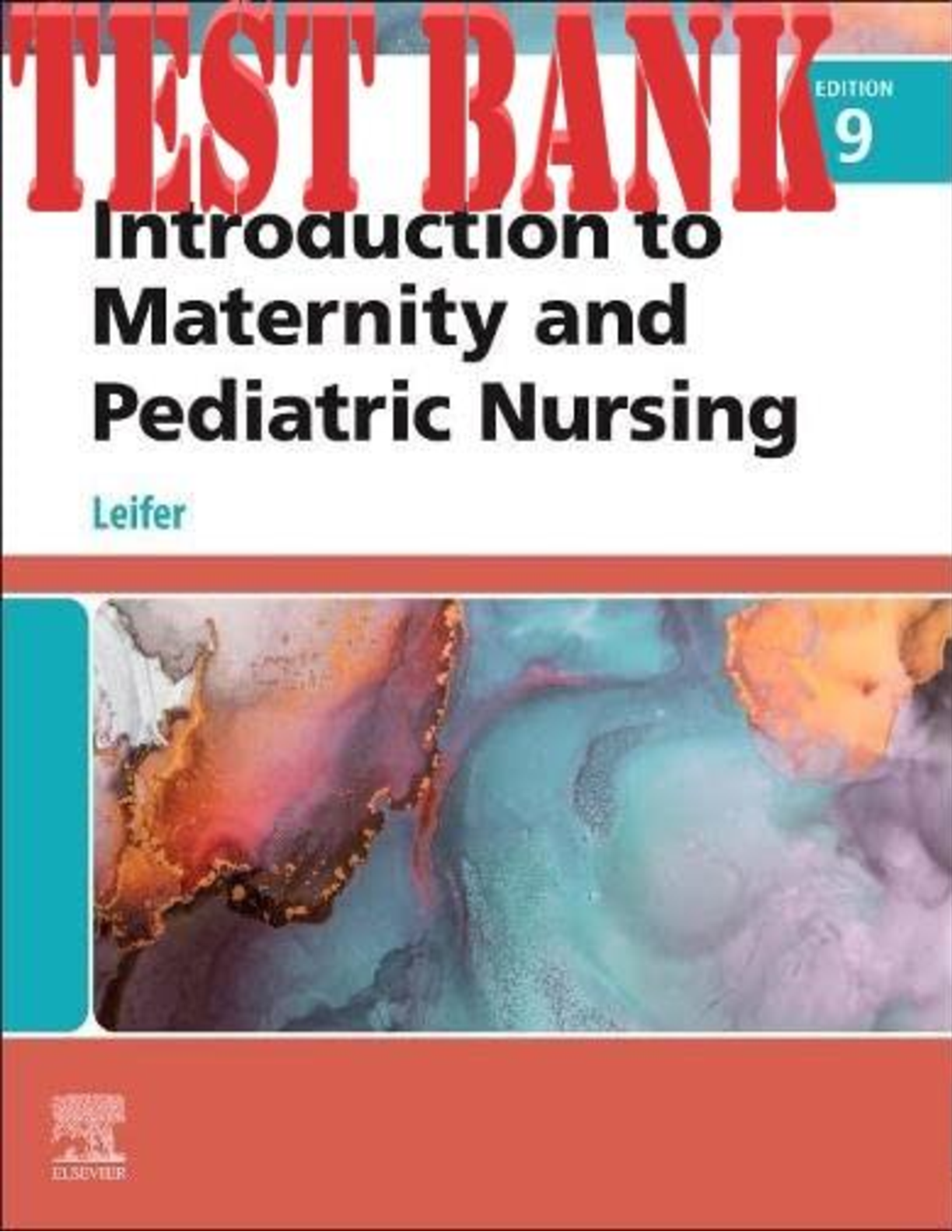
Reviews( 0 )
Recommended For You
Maternal Child Nursing Care> TEST BANK > Introduction to Maternity and Pediatric Nursing 9th Edition by Gloria Leifer - Complete, Elaborated and Latest ALL Chapters(1-34) Included |326| Pages - Questions & Answers- Test bank (All)
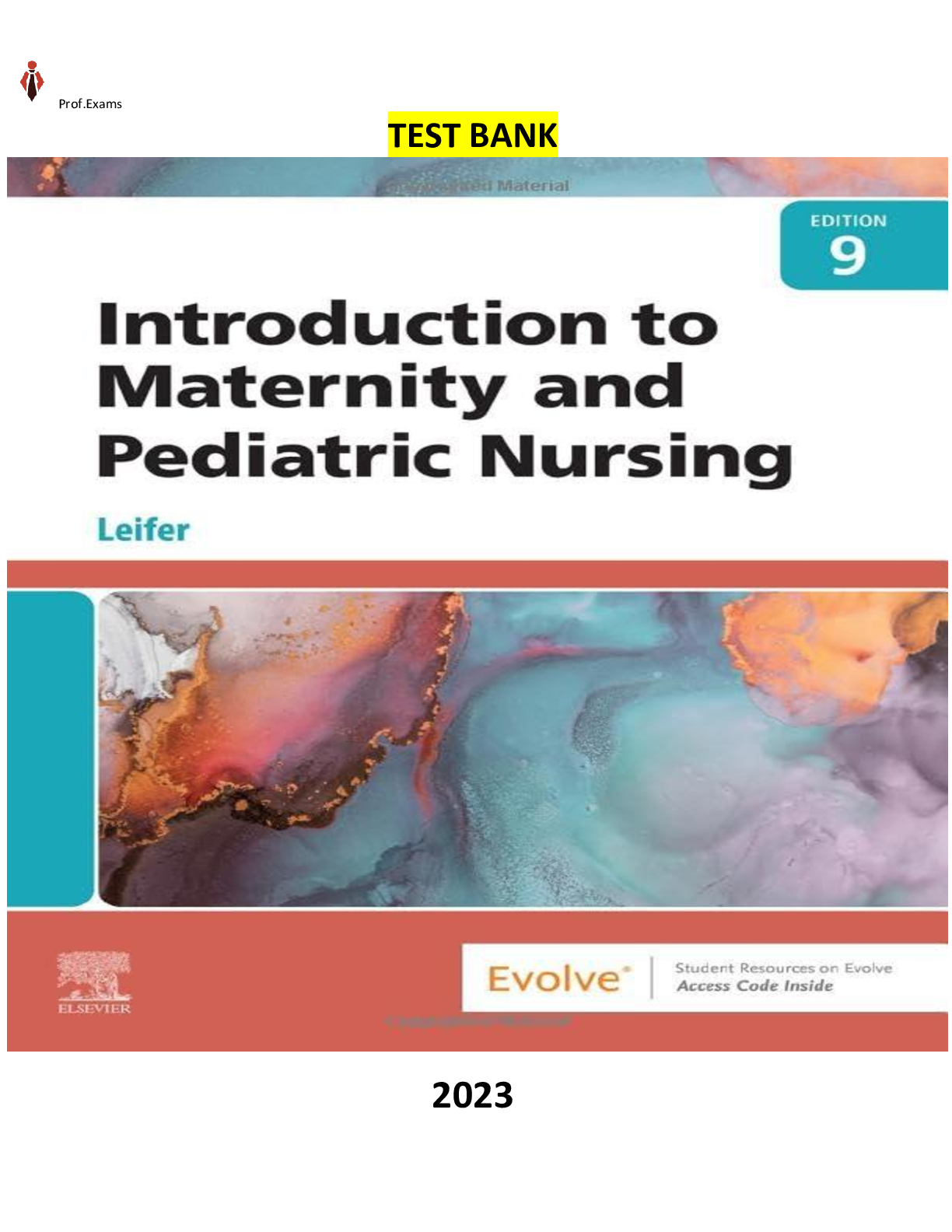
Introduction to Maternity and Pediatric Nursing 9th Edition by Gloria Leifer - Complete, Elaborated and Latest ALL Chapters(1-34) Included |326| Pages - Questions & Answers- Test bank
Introduction to Maternity and Pediatric Nursing 9th Edition by Gloria Leifer - Complete, Elaborated and Latest ALL Chapters(1-34) Included |326| Pages - Questions & Answers- Test bank Introduction...
By ProfXams , Uploaded: Sep 02, 2023
$18
Maternal Child Nursing Care> TEST BANK > Test Bank - Introduction to Maternity and Pediatric Nursing 9th Edition by Gloria Leifer - Complete Elaborated and Latest Test Bank. ALL Chapters(1-34)Included and Updated (All)
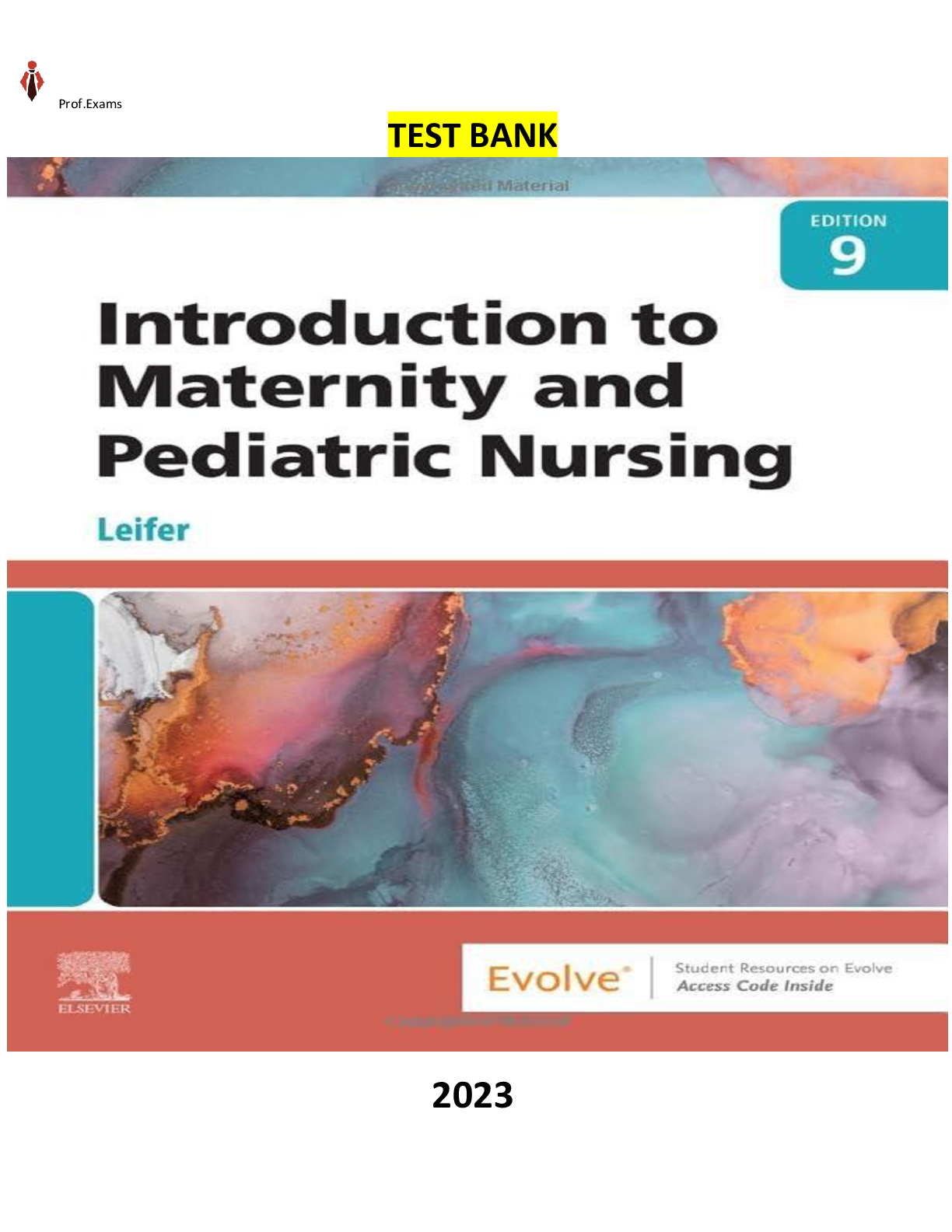
Test Bank - Introduction to Maternity and Pediatric Nursing 9th Edition by Gloria Leifer - Complete Elaborated and Latest Test Bank. ALL Chapters(1-34)Included and Updated
Test Bank - Introduction to Maternity and Pediatric Nursing 9th Edition by Gloria Leifer - Complete Elaborated and Latest Test Bank. ALL Chapters(1-34)Included and Updated Maternity, Pediatric, Nur...
By Prof.Exams , Uploaded: Sep 02, 2023
$24
*NURSING> TEST BANK > Test Bank - Pedriatic - 2020 Updated - MATERNITY AND PEDIATRIC NURSING 3Ed by RICCI (All)
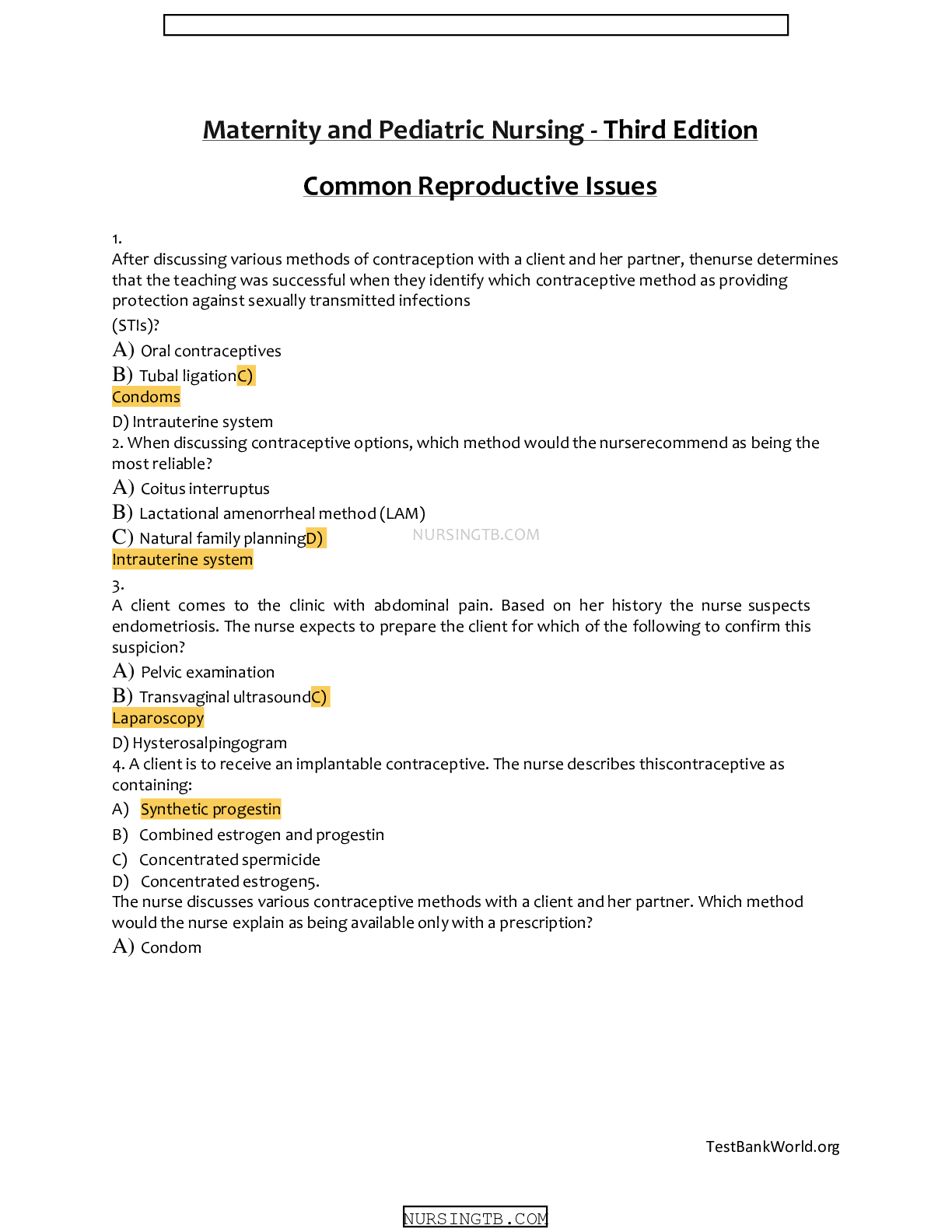
Test Bank - Pedriatic - 2020 Updated - MATERNITY AND PEDIATRIC NURSING 3Ed by RICCI
After discussing various methods of contraception with a client and her partner, thenurse determines that the teaching was successful when they identify which contraceptive method as providing prote...
By ProfXams , Uploaded: Jul 23, 2021
$25
*NURSING> TEST BANK > TEST BANK Maternity and Pediatric Nursing 3rd Edition by Ricci, Kyle, and Carman (All Chapters 1-51) (All)
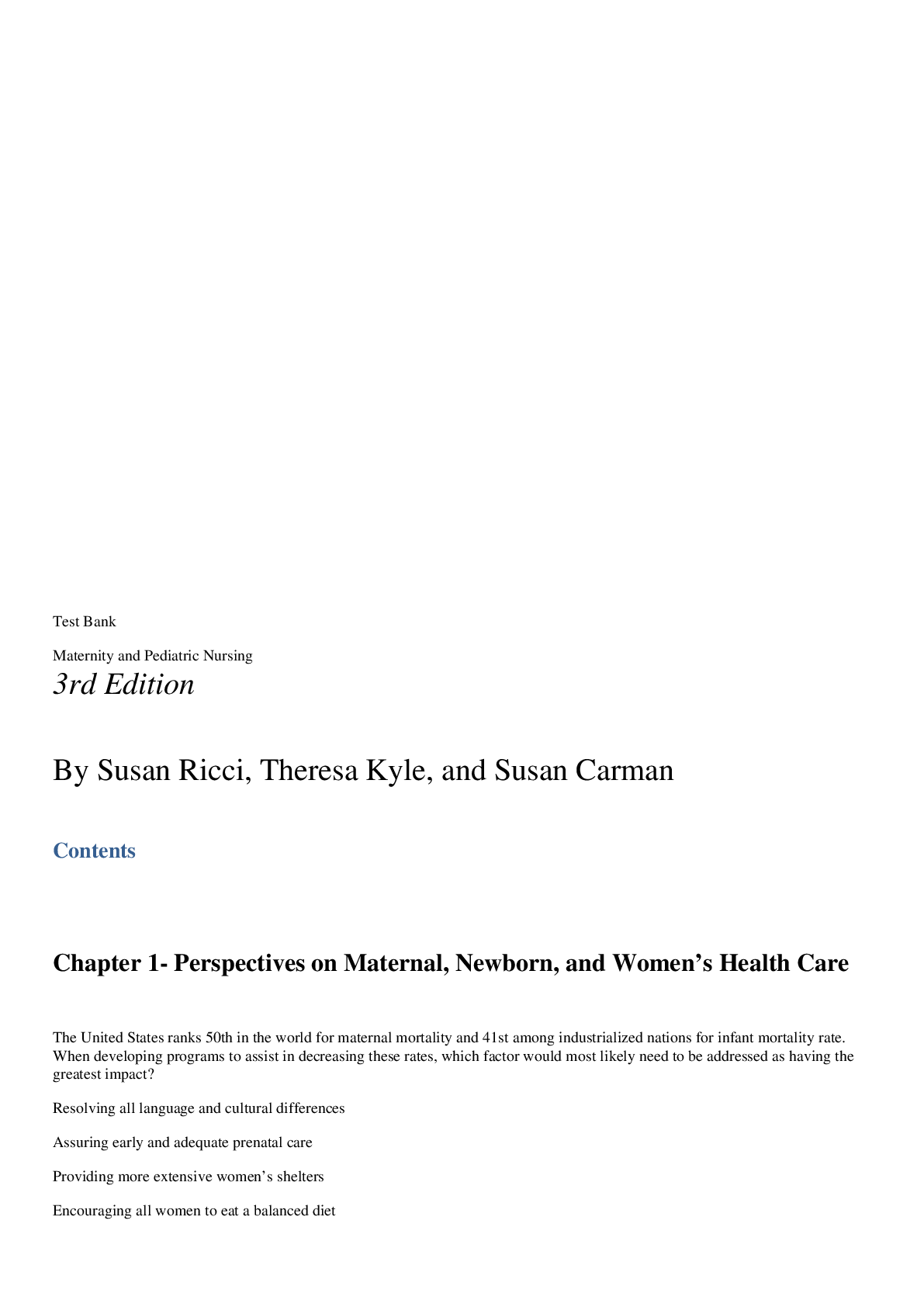
TEST BANK Maternity and Pediatric Nursing 3rd Edition by Ricci, Kyle, and Carman (All Chapters 1-51)
Test Bank Maternity and Pediatric Nursing 3rd Edition By Susan Ricci, Theresa Kyle, and Susan Carman Contents Chapter 1- Perspectives on Maternal, Newborn, and Women’s He...
By Kevin , Uploaded: May 20, 2021
$18
Business> TEST BANK > Test Bank For Introduction to Federal Income Taxation in Canada 43rd Edition (2022-2023) By Nathalie Johnstone , Devan Mescall , Julie Robson (All)
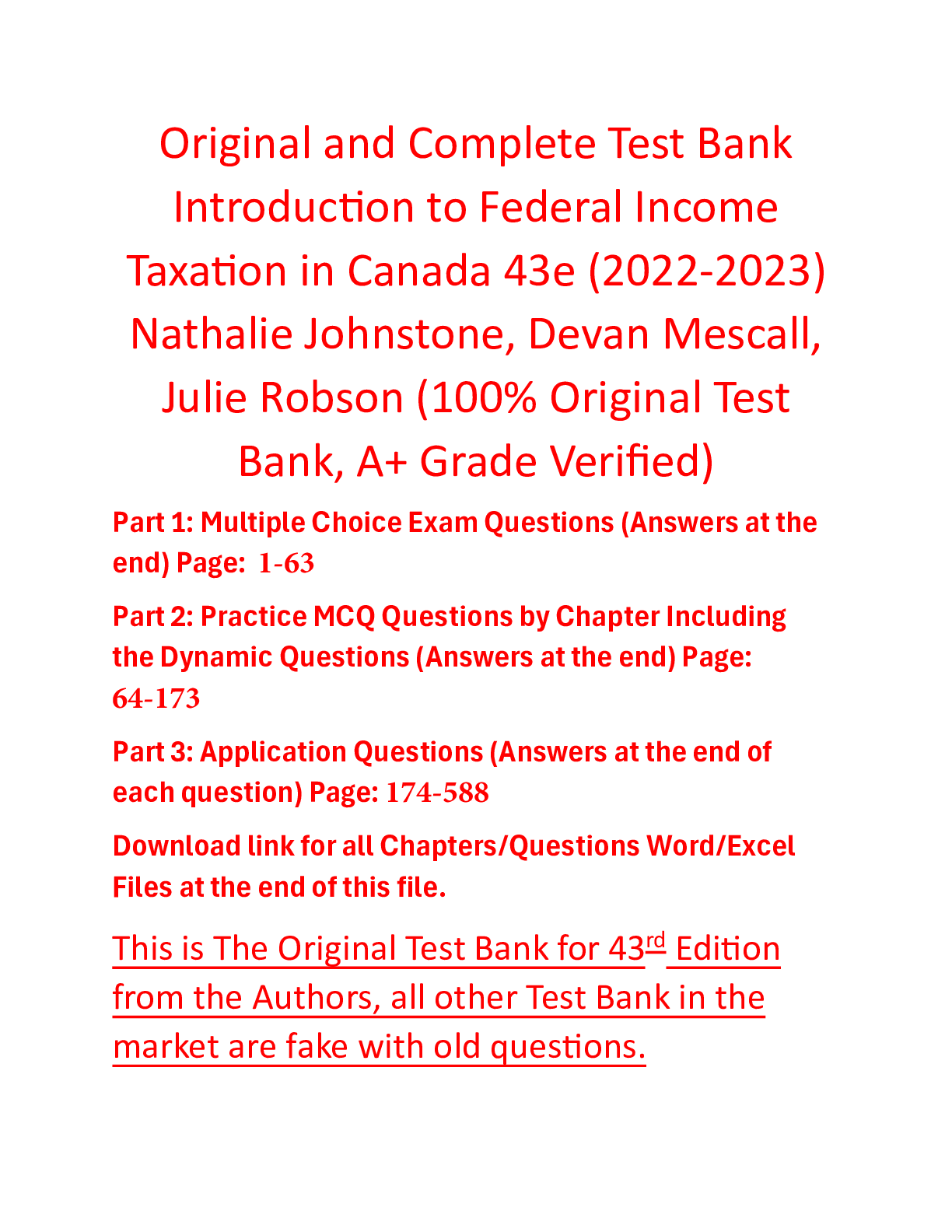
Test Bank For Introduction to Federal Income Taxation in Canada 43rd Edition (2022-2023) By Nathalie Johnstone , Devan Mescall , Julie Robson
This is Original 43rd Edition of Test Bank From Original Author. All Other Files in the market are fake/old Edition. Other Sellers Have changed old Edition Number to new But Test Bank is old Edition....
By eBookSmTb , Uploaded: Apr 01, 2024
$25
Accounting> TEST BANK > Test Bank for Introduction to Federal Income Taxation in Canada 44th Edition By Nathalie Johnstone, Devan Mescall, Julie Robson (All Chapters, 100% Original Verified, A+ Grade) (All)
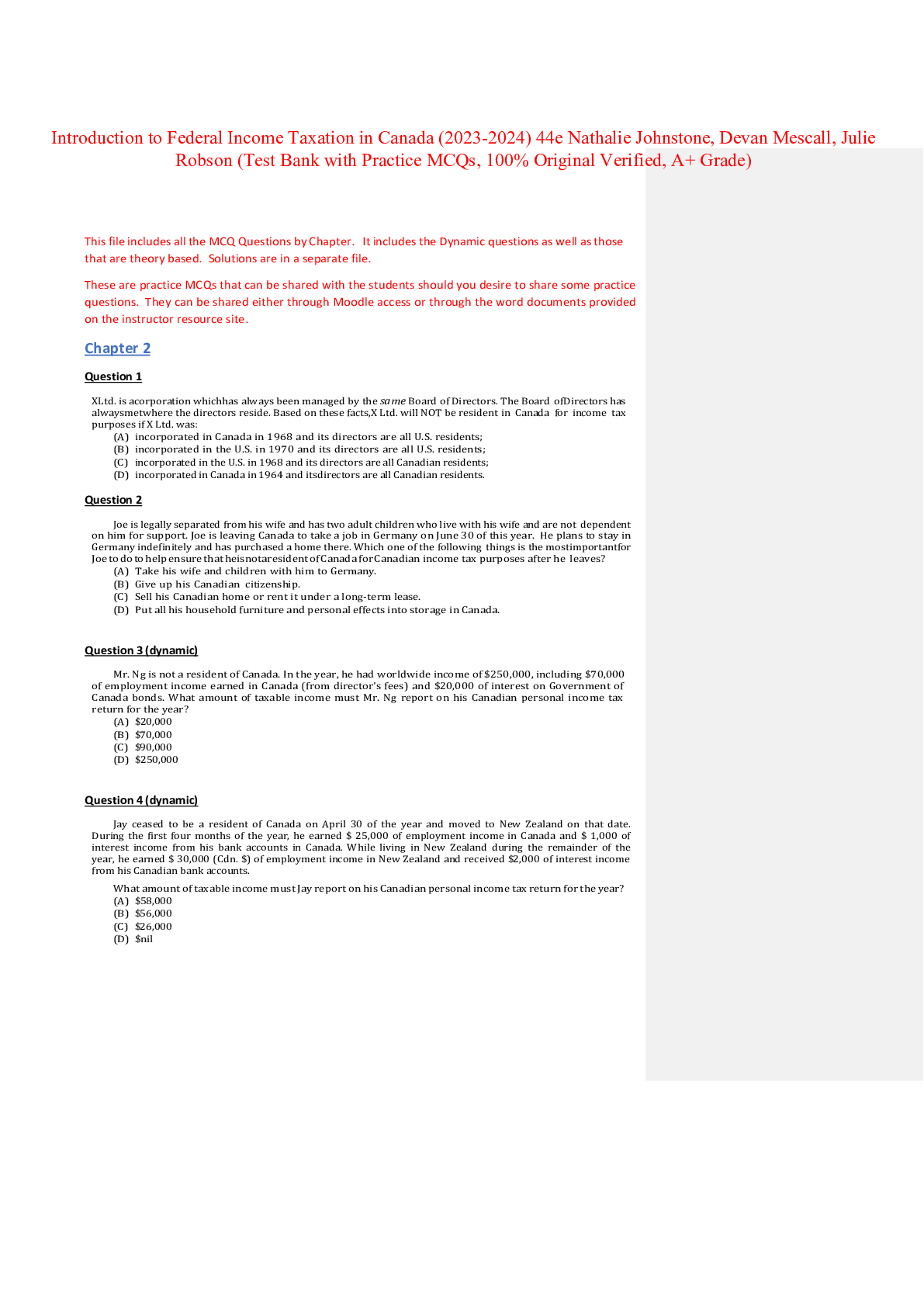
Test Bank for Introduction to Federal Income Taxation in Canada 44th Edition By Nathalie Johnstone, Devan Mescall, Julie Robson (All Chapters, 100% Original Verified, A+ Grade)
Test Bank for Introduction to Federal Income Taxation in Canada 44th Edition By Nathalie Johnstone, Devan Mescall, Julie Robson (All Chapters, 100% Original Verified, A+ Grade) Test Bank for Introduc...
By eBookSmTb , Uploaded: Mar 25, 2024
$15
*NURSING> TEST BANK > TEST BANK for Introduction to Critical Care Nursing 7th Edition by Sole. All Chapters 1 to 21. (All)
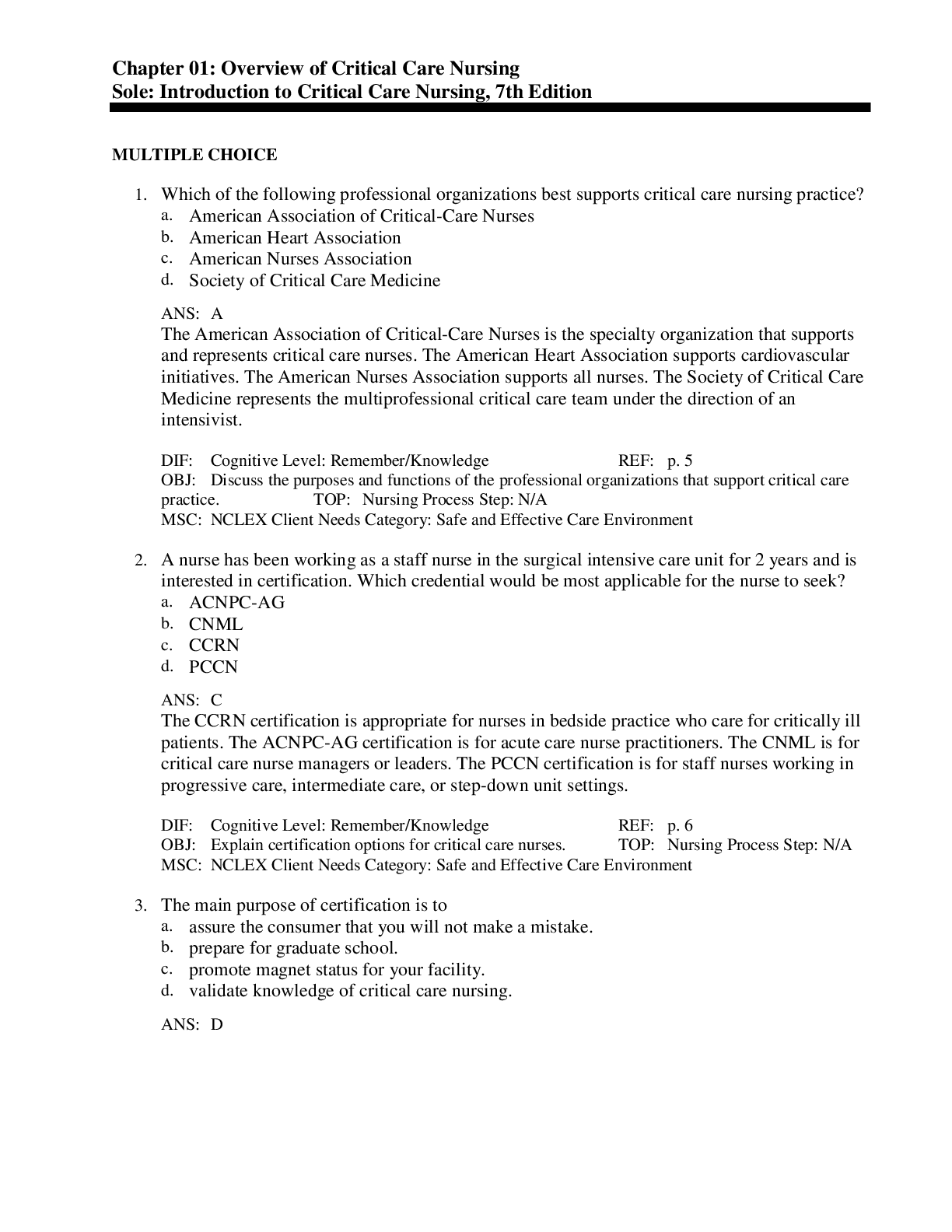
TEST BANK for Introduction to Critical Care Nursing 7th Edition by Sole. All Chapters 1 to 21.
Chapter 01: Overview of Critical Care Nursing Chapter 02: Patient and Family Response to the Critical Care Experience Chapter 03: Ethical and Legal Issues in Critical Care Nursing Chapter 04: End-...
By Kirsch , Uploaded: May 23, 2020
$17
*NURSING> TEST BANK > Test Bank for Introduction to Epidemiology 8 Edition Merrill All Chapters (All)
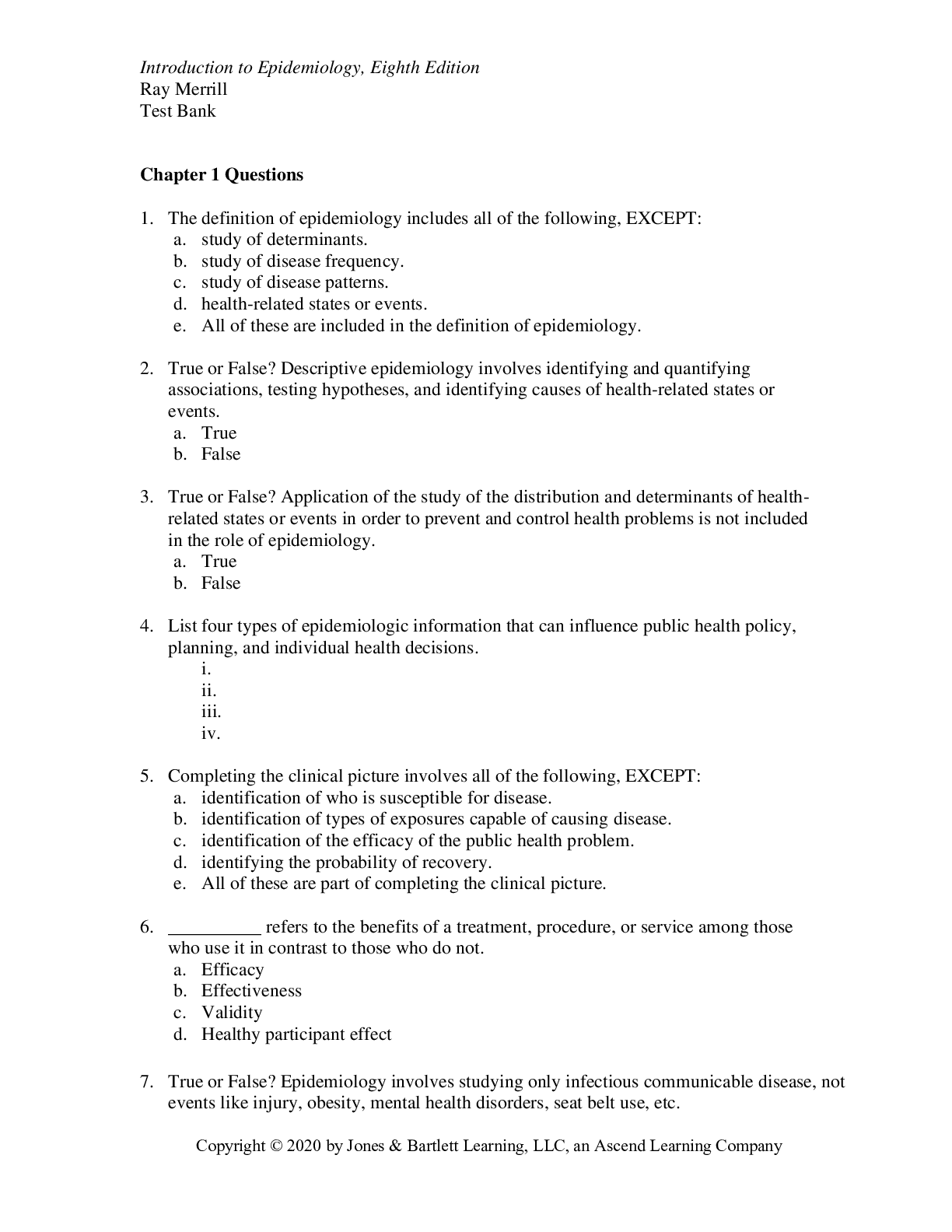
Test Bank for Introduction to Epidemiology 8 Edition Merrill All Chapters
Test Bank for Introduction to Epidemiology 8 Edition Merrill All Chapters Test Bank for Introduction to Epidemiology 8 Edition Merrill All Chapters Test Bank for Introduction to Epidemiology 8 Edition...
By Gradexam , Uploaded: Mar 07, 2024
$20
*NURSING> TEST BANK > Test Bank for Introduction to Sociology 2nd Edition Griffiths All Chapters (All)
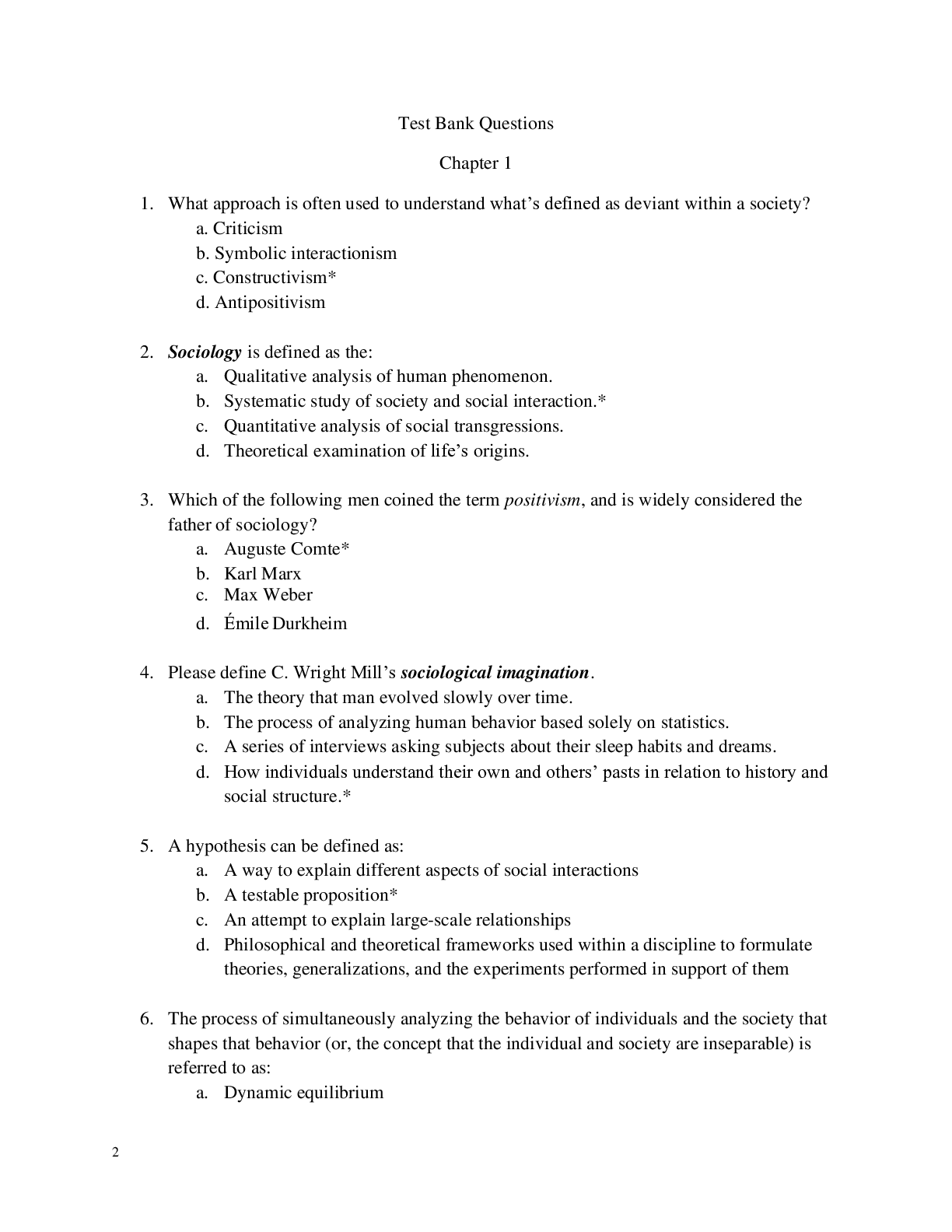
Test Bank for Introduction to Sociology 2nd Edition Griffiths All Chapters
Test Bank for Introduction to Sociology 2nd Edition Griffiths All Chapters Test Bank for Introduction to Sociology 2nd Edition Griffiths All Chapters Test Bank for Introduction to Sociology 2nd Editio...
By Gradexam , Uploaded: Mar 07, 2024
$20
*NURSING> TEST BANK > Test Bank for Introduction to Learning and Behavior 5th Edition Powell All Chapters (All)
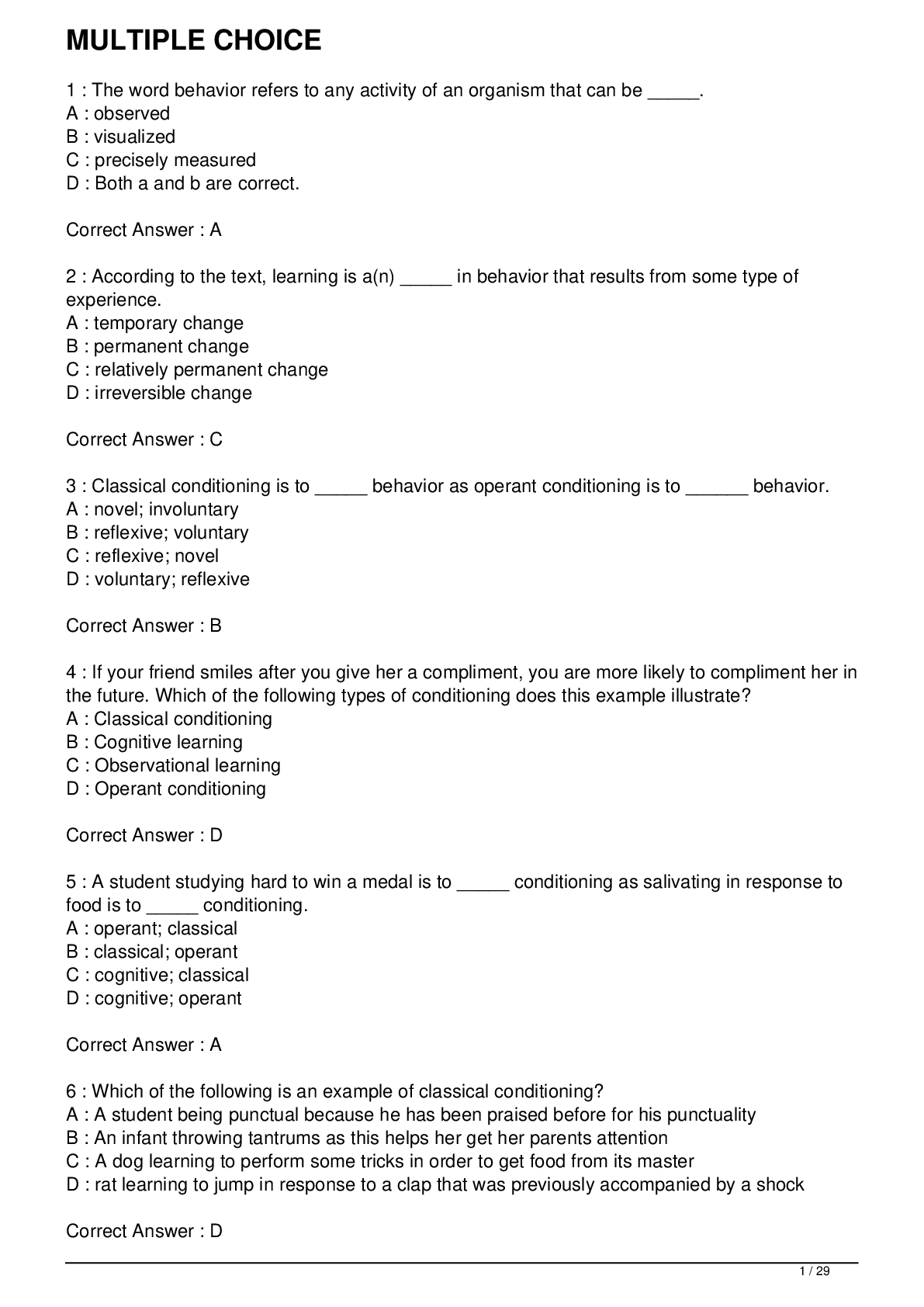
Test Bank for Introduction to Learning and Behavior 5th Edition Powell All Chapters
Test Bank for Introduction to Learning and Behavior 5th Edition Powell All Chapters Test Bank for Introduction to Learning and Behavior 5th Edition Powell All Chapters Test Bank for Introduction to Le...
By Gradexam , Uploaded: Mar 07, 2024
$20
Document information
Connected school, study & course
About the document
Uploaded On
Sep 17, 2020
Number of pages
2
Written in
Additional information
This document has been written for:
Uploaded
Sep 17, 2020
Downloads
0
Views
143






